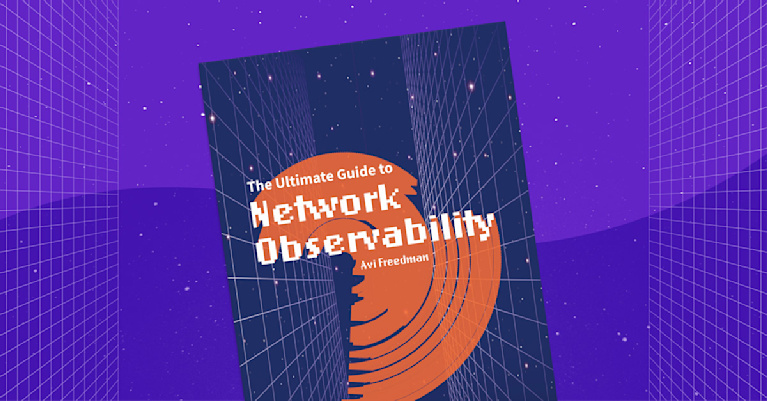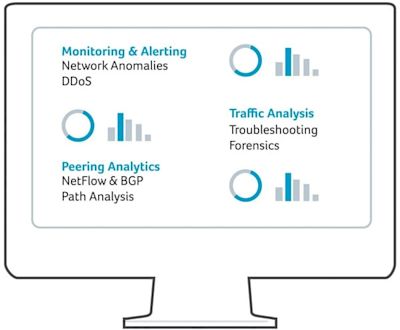NetFlow Analyzers and NetFlow Tools
An Overview of Netflow Analyzers and Other Network Traffic Monitoring Tools
NetFlow is a protocol used to collect metadata about network traffic traversing a network device (such as a router, switch, or host). Network operators can use NetFlow data to monitor bandwidth, determine network throughput, measure packet loss, and understand traffic congestion at a specific interface level.
Characterizing IP traffic and understanding how and where it flows is critical for ensuring network availability, performance, and security.
What is a NetFlow Analyzer?
A NetFlow analyzer is a tool designed for the monitoring, troubleshooting, and in-depth examination, interpretation, and analysis of network traffic flow data. By analyzing NetFlow, network administrators can facilitate more precise network capacity planning and ensure that resources are allocated effectively to align with organizational objectives. Additionally, it enables network operators to identify the appropriate locations to implement Quality of Service (QoS) policies and optimize resource utilization. NetFlow analyzers also play a critical role in network security by detecting Distributed Denial-of-Service (DDoS) attacks and other malicious network activities.
Teams across various departments, including network operations, engineering, planning, architecture, and security, can rely on NetFlow analysis as a primary intelligence source. Proper use of a NetFlow traffic analyzer can reduce the number of hardware and software technologies needed to manage networks. In this way, NetFlow analyzers can reduce network administration costs, improve cross-organizational collaboration and communication, and help cross-functional teams maximize the value of their network investments.
The definitive guide to running a healthy, secure, high-performance network

How NetFlow Tools Help with Application Monitoring and Profiling
NetFlow data enables network managers to gain a detailed, time-based view of application usage over the network. Any common NetFlow type can be used to recognize applications by port/protocol. Some of the more advanced extensions to NetFlow (via sFlow or v9/IPFIX templates), such as Cisco’s Application Visibility and Control (AVC) solution, can document much greater application detail. Content and service providers may utilize this information to plan and allocate network and application resources (e.g., web server sizing and location) to meet customer demands responsively. Enterprises can also use these insights to understand application dependencies and resource consumption.
Benefits of NetFlow Analyzers in Addressing Network Challenges
Using a NetFlow Analyzer offers valuable insights that help network operators, managers, and engineers overcome various common challenges, including:
Monitoring Network Traffic Contributors
NetFlow Analyzers enable network engineers to easily identify the top talkers and listeners on the network. This helps in understanding the distribution of network traffic, allocating resources effectively, and maintaining a balanced network environment.
Analyzing Application Traffic and its Impact
NetFlow Analyzers allow network administrators to understand the impact of application traffic on the network. For instance, they can identify unusual network loads, such as video content or large file transfers, and measure how application and policy changes affect costly WAN/SD-WAN traffic. This information is crucial in optimizing network performance and prioritizing critical applications.
Optimizing Internet Peering Relationships
Organizations using BGP peerings to maintain multi-homed connectivity to the Internet can benefit from NetFlow Analyzers by fusing NetFlow data with BGP routing data. This allows them to perform sophisticated peering analysis and optimize their peering arrangements, improving service quality, reducing peering costs, and even uncovering new revenue opportunities.
Troubleshooting and Identifying Network Pain Points
NetFlow Analyzers facilitate diagnosing slow network performance, detecting bandwidth hogs or misconfigurations, and characterizing bandwidth utilization swiftly. In addition, by providing an intrinsic representation of traffic totals and traffic details, these tools enable faster troubleshooting and resolution of network issues.
Detecting Unauthorized WAN Traffic
By analyzing a network with a NetFlow Analyzer, network administrators can identify applications causing congestion, verify their legitimacy, and adjust delivery policies to mitigate any adverse impact on higher-value concurrent traffic streams. This helps avoid costly upgrades to WAN services while maintaining optimal network performance.
DDoS and Anomaly Detection
NetFlow Analyzers also assist with the detection of DoS/DDoS attacks and other types of network behavior anomalies. This enables security teams to respond quickly to threats, safeguarding the network environment and ensuring stability.
Validating Quality of Service Parameters
As NetFlow data includes all packet priority markings, it can be used to verify that appropriate bandwidth has been allocated to each Class of Service (CoS) and that no CoS is over or under-subscribed. This helps network administrators maintain an efficient and well-optimized network.
NetFlow Analyzers provide NetOps teams with a comprehensive tool to monitor, optimize, and secure their network infrastructure while addressing various network challenges. By leveraging the insights offered by these tools, organizations can ensure a more efficient, reliable, and secure network environment.
Using NetFlow Tools to Assist in Network Planning
NetFlow data provides critical information for sophisticated analysis to optimize both strategic network planning (e.g., who to peer with, backbone upgrade planning, routing policy planning) as well as tactical network engineering decisions (e.g., adding additional VIPs to routers, upgrading link capacity) –- minimizing the total cost of network operations while maximizing network performance, capacity, and reliability.

Complete User Monitoring and Profiling with NetFlow Tools
NetFlow data enables network operators to understand customer/user utilization of network and application resources. NetOps teams can use this information to efficiently plan and allocate access, backbone, and application resources and detect and resolve potential security and policy violations.
Types of NetFlow Analyzers
When selecting a NetFlow analyzer, it’s essential to consider factors such as deployment model, scalability, maintenance requirements, and budget constraints. Each type of NetFlow analyzer has its advantages and drawbacks, so understanding your organization’s needs and preferences is crucial in finding the best solution for your network infrastructure.
Various types of NetFlow analyzers are available in the market, each with distinct features, capabilities, and deployment options. Here are some common types of NetFlow analyzers:
On-Premises NetFlow Analyzers
On-premises NetFlow analyzers are installed and managed within your organization’s network infrastructure. These tools often require dedicated hardware and software resources and regular maintenance and updates. On-premises analyzers can be a good choice for organizations with strict security requirements, established network infrastructure, and the necessary resources to manage and maintain the solution.
SaaS NetFlow Analyzers
Software-as-a-Service (SaaS) NetFlow analyzers, such as Kentik’s NetFlow analyzer, are cloud-based solutions that offer an alternative to traditional on-premises analyzers. These tools provide a flexible and scalable approach to monitoring and analyzing network traffic without requiring dedicated hardware or software. In addition, SaaS NetFlow analyzers can be easily accessed through a web browser, allowing network administrators and engineers to monitor and manage their network from anywhere with an internet connection.
SaaS NetFlow analyzers often provide features like automatic updates, scalability, and reduced maintenance overhead, making them an attractive option for organizations seeking a cost-effective and easily manageable solution.
Open-Source NetFlow Analyzers
Open-source NetFlow analyzers are tools developed and maintained by the community, offering a cost-effective alternative to commercial solutions. These analyzers usually provide basic network traffic monitoring and analysis capabilities and can be customized to suit an organization’s specific needs. However, they may require more technical expertise and resources to set up, configure, and maintain. Open-source NetFlow analyzers could be an option for organizations with limited budgets or those looking to build a custom solution tailored to their unique requirements.
Related Reading
You can learn more about NetFlow and netflow analysis in the following related Kentipedia entries:
Learn More about Kentik’s NetFlow Analysis Tools
The Kentik Network Intelligence Platform provides a comprehensive view of network traffic flows, including hybrid and multicloud environments. By visualizing and analyzing network flow data, Kentik enables network professionals to understand traffic patterns, identify performance issues, and enhance security. Key features include:
- Real-Time Network Flow Monitoring: Visualize and analyze flow data in real-time across all network environments.
- Advanced Network Traffic Analytics: Identify anomalies and optimize network performance with detailed flow insights.
- Unified Dashboard: Monitor network paths, performance, and security from a single interface.
Kentik offers a suite of advanced network monitoring solutions designed for today’s complex, multicloud network environments. The Kentik Network Intelligence Platform empowers network pros to monitor, run and troubleshoot all of their networks, from on-premises to the cloud. Kentik’s network observability solution addresses all three pillars of modern network monitoring, delivering visibility into network flow, powerful synthetic testing capabilities, and Kentik NMS, the next-generation network monitoring system.
To see how Kentik can bring the benefits of network observability to your organization, request a demo or sign up for a free trial today.


